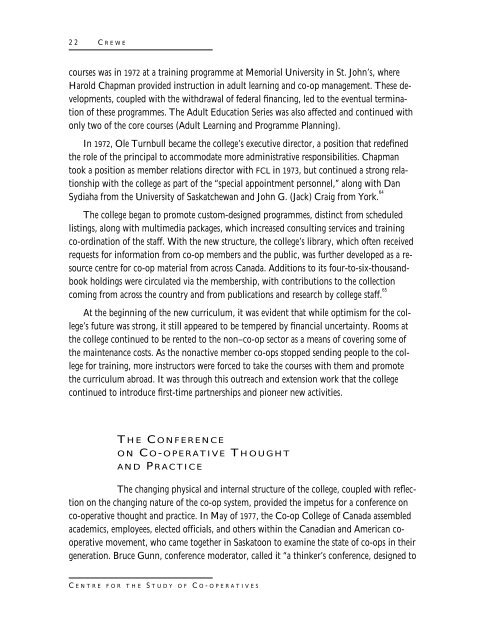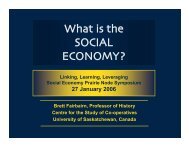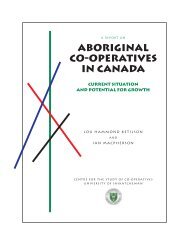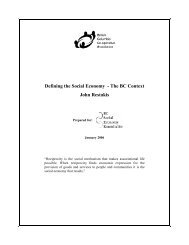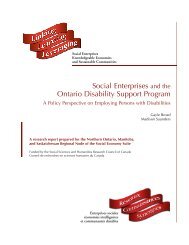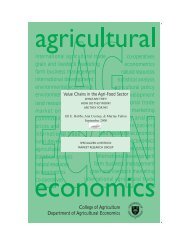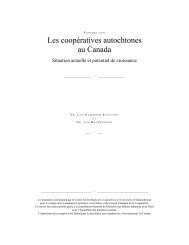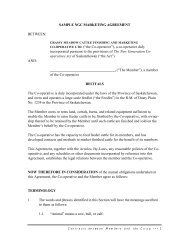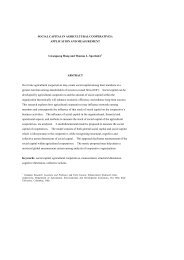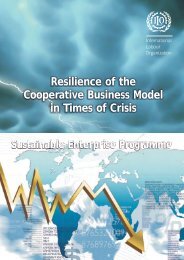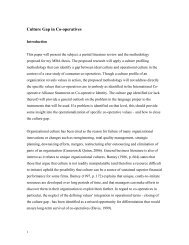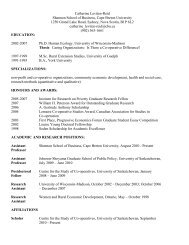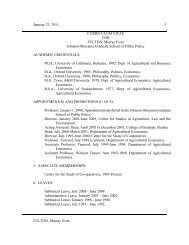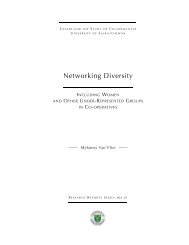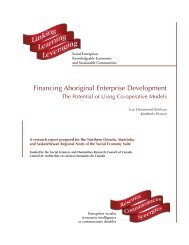Co-op College History - Centre for the Study of Co-operatives
Co-op College History - Centre for the Study of Co-operatives
Co-op College History - Centre for the Study of Co-operatives
You also want an ePaper? Increase the reach of your titles
YUMPU automatically turns print PDFs into web optimized ePapers that Google loves.
22 CREWE<br />
courses was in 1972 at a training programme at Memorial University in St. John’s, where<br />
Harold Chapman provided instruction in adult learning and co-<strong>op</strong> management. These devel<strong>op</strong>ments,<br />
coupled with <strong>the</strong> withdrawal <strong>of</strong> federal financing, led to <strong>the</strong> eventual termination<br />
<strong>of</strong> <strong>the</strong>se programmes. The Adult Education Series was also affected and continued with<br />
only two <strong>of</strong> <strong>the</strong> core courses (Adult Learning and Programme Planning).<br />
In 1972, Ole Turnbull became <strong>the</strong> college’s executive director, a position that redefined<br />
<strong>the</strong> role <strong>of</strong> <strong>the</strong> principal to accommodate more administrative responsibilities. Chapman<br />
took a position as member relations director with FCL in 1973, but continued a strong relationship<br />
with <strong>the</strong> college as part <strong>of</strong> <strong>the</strong> “special appointment personnel,” along with Dan<br />
Sydiaha from <strong>the</strong> University <strong>of</strong> Saskatchewan and John G. (Jack) Craig from York. 64<br />
The college began to promote custom-designed programmes, distinct from scheduled<br />
listings, along with multimedia packages, which increased consulting services and training<br />
co-ordination <strong>of</strong> <strong>the</strong> staff. With <strong>the</strong> new structure, <strong>the</strong> college’s library, which <strong>of</strong>ten received<br />
requests <strong>for</strong> in<strong>for</strong>mation from co-<strong>op</strong> members and <strong>the</strong> public, was fur<strong>the</strong>r devel<strong>op</strong>ed as a resource<br />
centre <strong>for</strong> co-<strong>op</strong> material from across Canada. Additions to its four-to-six-thousandbook<br />
holdings were circulated via <strong>the</strong> membership, with contributions to <strong>the</strong> collection<br />
coming from across <strong>the</strong> country and from publications and research by college staff. 65<br />
At <strong>the</strong> beginning <strong>of</strong> <strong>the</strong> new curriculum, it was evident that while <strong>op</strong>timism <strong>for</strong> <strong>the</strong> college’s<br />
future was strong, it still appeared to be tempered by financial uncertainty. Rooms at<br />
<strong>the</strong> college continued to be rented to <strong>the</strong> non–co-<strong>op</strong> sector as a means <strong>of</strong> covering some <strong>of</strong><br />
<strong>the</strong> maintenance costs. As <strong>the</strong> nonactive member co-<strong>op</strong>s st<strong>op</strong>ped sending pe<strong>op</strong>le to <strong>the</strong> college<br />
<strong>for</strong> training, more instructors were <strong>for</strong>ced to take <strong>the</strong> courses with <strong>the</strong>m and promote<br />
<strong>the</strong> curriculum abroad. It was through this outreach and extension work that <strong>the</strong> college<br />
continued to introduce first-time partnerships and pioneer new activities.<br />
T HE C ONFERENCE<br />
ON C O-OPERATIVE T HOUGHT<br />
AND P RACTICE<br />
The changing physical and internal structure <strong>of</strong> <strong>the</strong> college, coupled with reflection<br />
on <strong>the</strong> changing nature <strong>of</strong> <strong>the</strong> co-<strong>op</strong> system, provided <strong>the</strong> impetus <strong>for</strong> a conference on<br />
co-<strong>op</strong>erative thought and practice. In May <strong>of</strong> 1977, <strong>the</strong> <strong>Co</strong>-<strong>op</strong> <strong>Co</strong>llege <strong>of</strong> Canada assembled<br />
academics, employees, elected <strong>of</strong>ficials, and o<strong>the</strong>rs within <strong>the</strong> Canadian and American co<strong>op</strong>erative<br />
movement, who came toge<strong>the</strong>r in Saskatoon to examine <strong>the</strong> state <strong>of</strong> co-<strong>op</strong>s in <strong>the</strong>ir<br />
generation. Bruce Gunn, conference moderator, called it “a thinker’s conference, designed to<br />
C ENTRE FOR THE S TUDY OF C O - OPERATIVES


